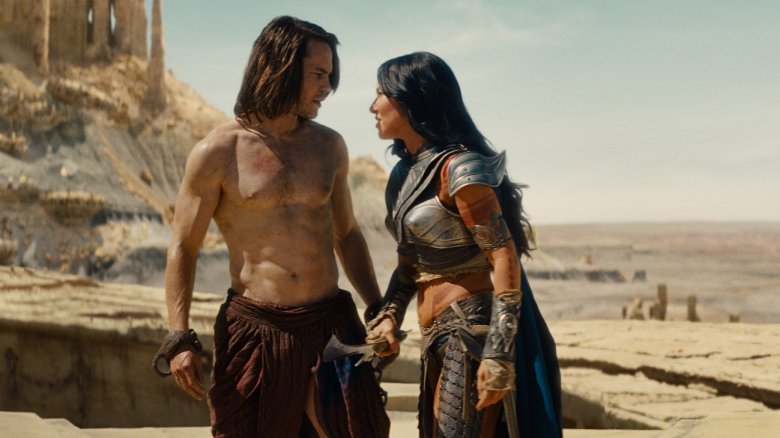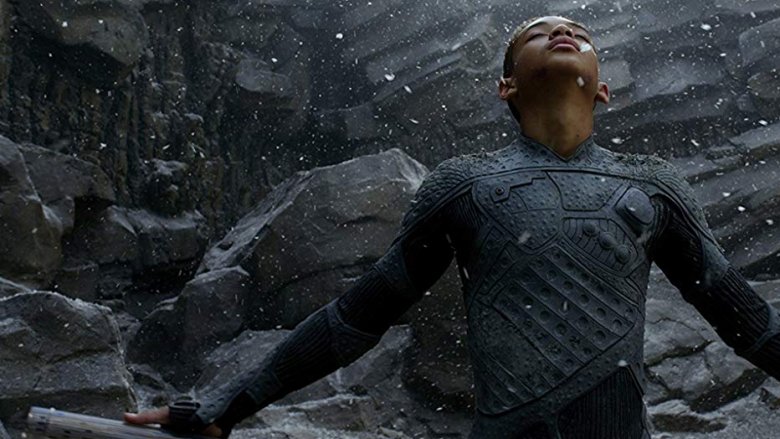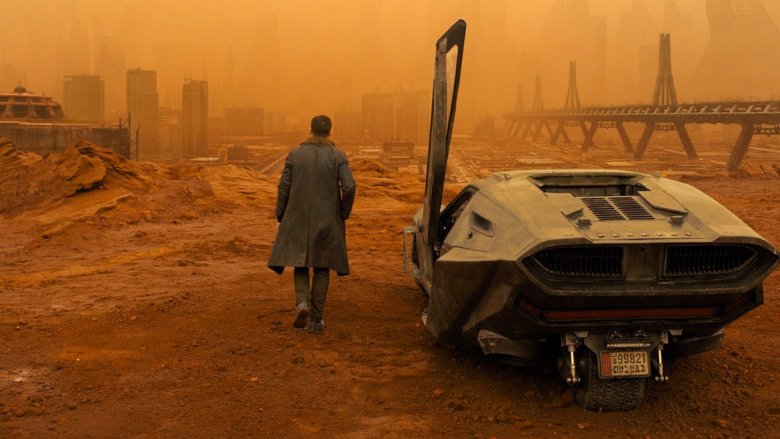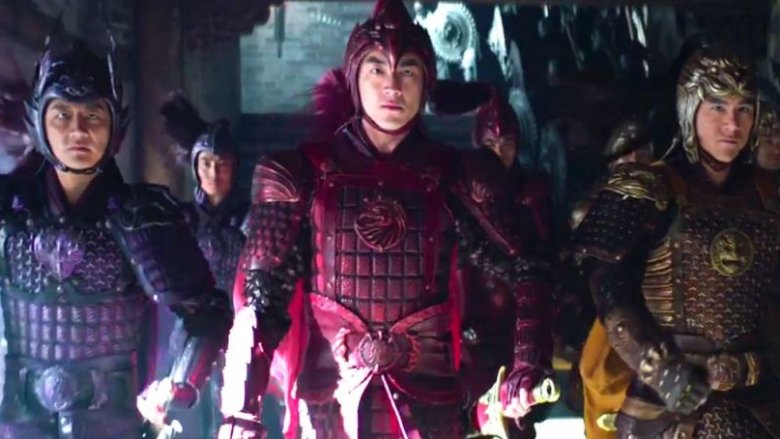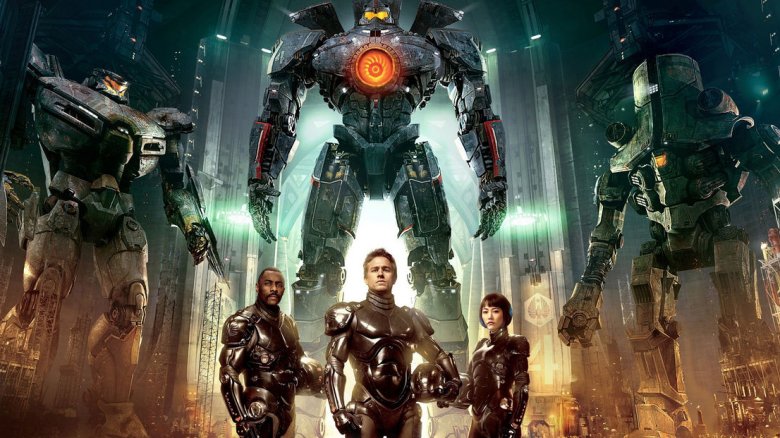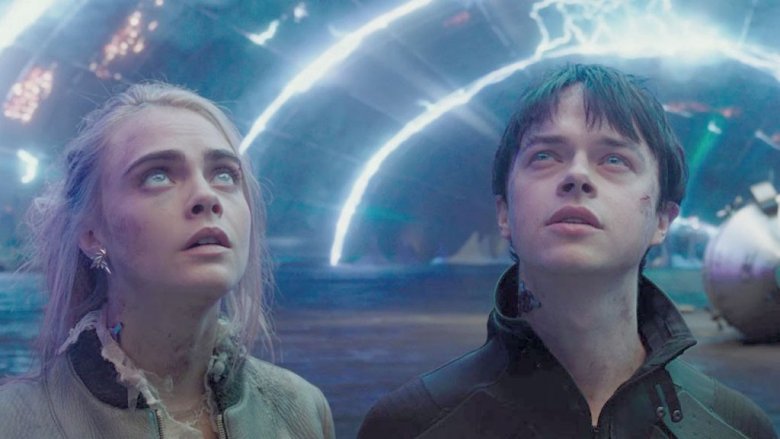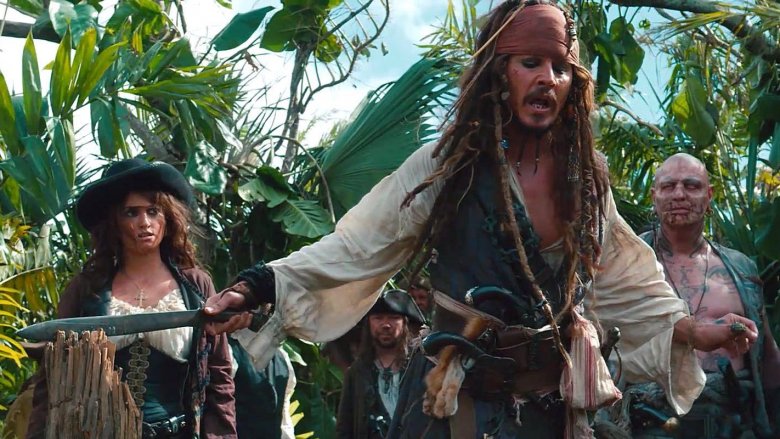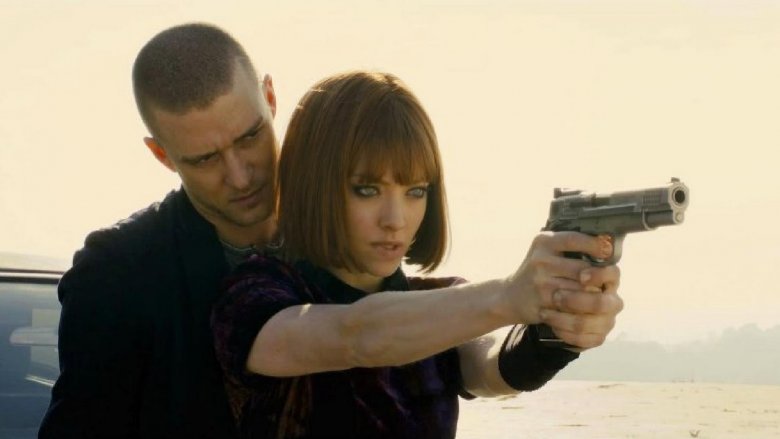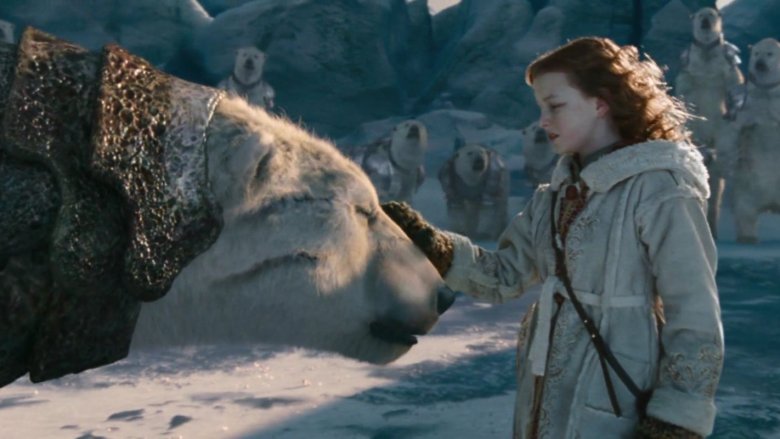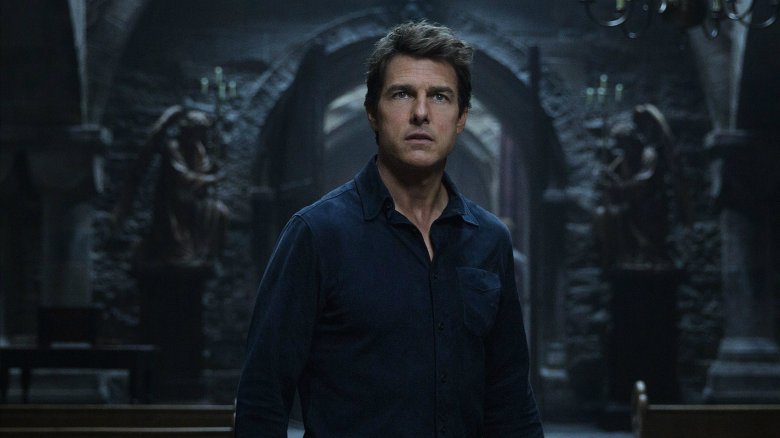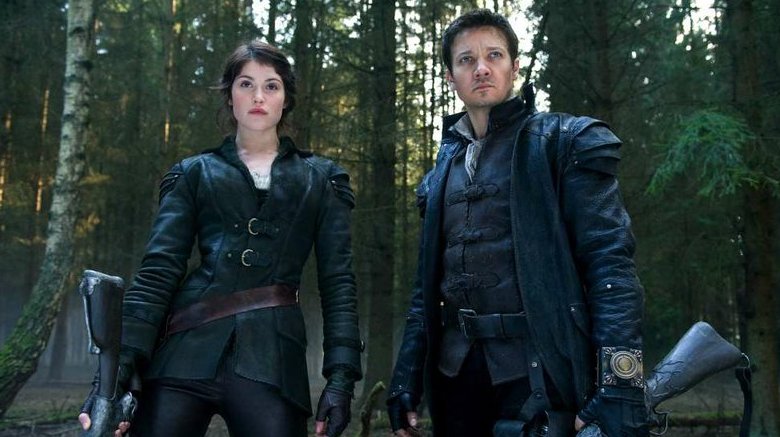American Flops That Are Insanely Popular In Other Countries
A big-budget studio film, whether it's a sequel, a reboot, or a totally original concept, is always a big gamble. Everyone from the movie's producers to its stars hopes that the film performs well. The biggest issue, in the end, is whether or not it makes its budget back (and hopefully exceeds it). There's also the question of whether or not the film performs critically. These factors could lead to a film becoming a massive franchise that offers guaranteed jobs to everyone involved.
Sometimes, a film with a small budget can wildly surpass anybody's expectations. 2017's Get Out is a notable example, making a worldwide gross of over $250 million after being made on a shoestring $4.5 million budget. Still, a flop is a flop, and when a film can't even clear its own budget, it's a pretty dire sign. Luckily, international audiences can sometimes swoop in to save the day. These American films all ended up thriving thanks to wins overseas, even though they bombed terribly at the U.S. box office.
John Carter
Even for a big-budget blockbuster, 2012's John Carter came with a pretty impressive pedigree. Pulitzer Prize-winning author Michael Chabon co-wrote the screenplay, director Andrew Stanton was best known for Pixar masterpieces like WALL-E and Finding Nemo, and star Taylor Kitsch was fresh off his successful turn in television's Friday Night Lights. Kitsch was flanked by even more star power from the likes of Willem Dafoe and Bryan Cranston. Based on A Princess of Mars by Edgar Rice Burroughs, the film tells the story of a Civil War soldier who is transported to the planet of Barsoom, where he becomes leader of an alien race and helps them fight against their ancient enemies.
Disney took a fairly large gamble on this film, granting John Carter a $350 million budget. It definitely didn't pay off — with a paltry $73 million at the North American box office and poor reviews, it officially became one of the biggest box office bombs of all time. Despite better returns from both Russia and China, the film's failure led to a cancelled sequel as well as the resignation of a high-ranking Disney executive, making John Carter one of modern Hollywood's greatest cautionary tales.
Baywatch
As a reboot of one of television's most widely watched and popular shows, 2017's Baywatch, starring Zac Efron and Dwayne "The Rock" Johnson, should have been a slam-dunk summer blockbuster. Following the elite Baywatch team of lifeguards, headed by Mitch Buchannon (Johnson), the film introduces Matt Brody (Efron), a former Olympic swimmer looking to rehabilitate his image by joining the squad. As the two butt heads, powerful businesswoman Victoria Leeds (Priyanka Chopra) continues operating a massive drug smuggling ring right under their noses. Eventually, Buchannon and Brody must set aside their differences to take down her cartel. The film features a few cameos from the classic Baywatch series, including appearances by both Pamela Anderson and David Hasselhoff.
Baywatch pulled in a weak $58 million at the North American box office (which was especially bad considering its budget of around $69 million) and was panned by critics, even "scoring" nominations at the Golden Raspberry Awards. Though it's still regarded as a critical failure, it did end up with a worldwide total gross of $177 million, thanks in large part to Germany, where David Hasselhoff's announced cameo drummed up an enormous amount of excitement. The lesson Hollywood learned here is that you should never underestimate how much the entire country of Germany loves the Hoff.
After Earth
In the years since The Sixth Sense, director M. Night Shyamalan has struck out quite a few times, and his 2013 effort After Earth is no exception. Widely viewed as a kind of glamour project for star Will Smith and his son Jaden, this post-apocalyptic film introduces audiences to General Cypher Raige and his son Kitai, who were previously relocated with the rest of humanity to a planet called Nova Prime, which is under attack. The pair end up crashing their ship on a decimated Earth during an exploratory voyage, and have to fight for their lives to return home and make sure that Nova Prime stays safe.
Will Smith himself conceived of After Earth as the start of a potential trilogy. In the end, its $135 million budget proved to be disastrous for the film's North American returns, as it brought in only $60 million (and was largely despised by critics), but luckily for Sony, the film fared much better internationally. It drew big crowds and a much higher gross in other countries, eventually bringing its international total to $183 million, proving most popular in China and Mexico — but despite this last minute save, Smith has still said he views After Earth as the biggest failure of his career.
Blade Runner 2049
As a highly anticipated sequel to the beloved and influential 1982 film Blade Runner, 2017's Blade Runner 2049 was widely expected to succeed both critically and commercially, thanks in no small part to venerated director Denis Villeneuve (Arrival) and a talented cast that included Harrison Ford reprising his original role as Rick Deckard, alongside Ryan Gosling, Robin Wright, and Jared Leto. Set thirty years after the first film, 2049 stars Gosling as K, a new generation of blade runner who learns that replicants can reproduce like humans. He's been sent to find the only replicant-human child and eliminate it. Along the way, he starts to believe he himself might actually be this mysterious child.
Unlike many other box office flops, Blade Runner 2049 fared very well critically — it made several year-end best-of lists for 2017. With five nominations at the Academy Awards, it ended up winning Best Visual Effects and Best Cinematography (the latter for veteran cinematographer Roger Deakins, marking his first Oscar win after several nominations). However, the film performed poorly at the box office, grossing just over $90 million in North America and $167 million across the world, and it ultimately cost the studio around $80 million, despite surges of popularity in other countries.
The Great Wall
An American-Chinese co-production, 2016's The Great Wall starred Matt Damon, Pedro Pascal, and Willem Dafoe. Chinese director Zhang Yimou took the helm, making his first foray into English language films. Shot on location in China, the movie tells the story of European mercenaries who are on the hunt for gunpowder during the reign of China's Song Dynasty. During their journey, they encounter a mysterious monster, eventually teaming up with a group called the Nameless Order to fight alien creatures called the Tao Tieh, which keep making attempts to scale or otherwise cross the famous Great Wall of China.
The film was met with controversy prior to its release, largely thanks to Matt Damon's starring role in a Chinese movie, though the project's director denied accusations of whitewashing. Perhaps thanks to poor perception ahead of its release — or maybe because many critics decided the film wasn't racist, but simply boring — the movie fared poorly at the North American box office, bringing in just $45 million. Though it surged to $170 million in China, making it markedly more popular there, the film's enormous budget meant that it was still ultimately considered a financial disappointment, putting the future of joint productions between the two countries in jeopardy.
Pacific Rim
Directed by Guillermo del Toro (who recently won his first Academy Award for The Shape of Water), Pacific Rim was a rare attempt at a blockbuster from a filmmaker best known for his arthouse forays into fantasy and horror. Starring Idris Elba, Charlie Hunnam, and Charlie Day, the film takes audiences into a future where humans are at war with kaiju, enormous sea monsters that came from an interdimensional portal at the bottom of the Pacific Ocean. The only way to successfully fight the kaiju is with Jaegers, huge robots each controlled by two pilots who must be joined by a telepathic link.
Likely thanks to del Toro's imaginative touch and an unexpectedly deep story, Pacific Rim premiered to mostly positive reviews. But the North American box office results, at just $101 million against a budget of $190 million, weren't nearly as glowing. However, the film found enormous success in other countries — it was a huge hit in China in particular, and thanks to its worldwide box office totals, it crossed $400 million and became an enormous commercial success for del Toro. It even spawned a sequel, Pacific Rim Uprising, which pulled in an impressive $290 million worldwide, although it was widely viewed as inferior to the original.
Valerian and the City of a Thousand Planets
Adapted from a graphic novel and funded personally by famed director Luc Besson, Valerian and the City of a Thousand Planets contained multitudes. This 3D space opera was a collaboration between France and the United States featured amazingly complex visual effects, telling the story of a world government attempting to keep peace throughout the entire universe. Starring Cara Delevingne and Dane DeHaan, the film also featured huge names like Ethan Hawke, Rihanna, and Clive Owen. As Valerian and Laureline, DeHaan and Delevingne travel throughout the galaxy, fighting battles on various planets as they struggle to maintain peace and order.
Thanks to crowdfunding efforts by Besson (and some of his own money), the film became the most expensive European production and the most expensive independent film ever made, with a budget of around $180 million. This gamble hardly paid off when the film debuted in the United States, with a box office intake of just over $40 million alongside mixed reviews from most critics. Even though it fared better abroad (particularly in China), earning $184 million throughout the world, it was still considered a commercial failure in the States, even causing stock in its production company, EuropaCorp, to drop.
Pirates of the Caribbean: On Stranger Tides
Originally based on the popular Disneyland ride, Pirates of the Caribbean has spawned a number of sequels, most of which offered up diminishing returns both critically and commercially. After the first film, Pirates of the Caribbean: The Curse of the Black Pearl was a hit with critics and audiences alike in 2003 — even earning an Academy Award nomination for Johnny Depp — it seemed natural that a franchise would be born. By the time the fourth film, On Stranger Tides, came along in 2011, original director Gore Verbinski had been replaced by Academy Award winner Rob Marshall (Chicago), who cast Penélope Cruz alongside Depp in a battle against Blackbeard (Ian McShane) and a search for the Fountain of Youth.
Though On Stranger Tides didn't perform too dismally in North America, bringing in around $241 million (still a low intake compared to the rest of the series), that came nowhere close to its take abroad. Worldwide, it earned a whopping $804 million, becoming the highest-grossing Pirates film outside of North America. Though enthusiasm for the series may have been waning in the States, fans around the world were still clamoring for more from the Pirates franchise.
In Time
After Justin Timberlake's lauded turn in David Fincher's critically beloved The Social Network, the pop star turned leading man had his pick of film projects. In 2011, though, he made a large misstep with In Time. An original science fiction concept by Andrew Niccol (writer of The Truman Show), the film starred Timberlake as Will, a factory worker living in a society where all humans stop aging at 25 and time becomes currency, with each person's personal clock placed on their arm so that they know how much time they have left. A police force called the Timekeepers roams the streets, and unbeknownst to most, the rich are hoarding as much time as possible, leaving the poor with shorter, harder lives. Throughout the film, Will, who has somewhat accidentally earned 116 years of time, must evade the Timekeepers, keep his loved ones safe, and above all, keep an eye on his clock.
Despite a promising premise and a solid cast, which included Amanda Seyfried and Cillian Murphy, critics weren't fans of In Time. Ultimately, neither were North American audiences. Against a budget of $40 million, the film only grossed $37 million in North America. It surged ahead abroad, though, racking up a whopping $136 million internationally (it was especially popular in both Japan and Russia), making up for its failure to break even at home.
The Golden Compass
Adapting Philip Pullman's controversial children's book series The Mortal Instruments was no small feat. In 2007, writer/director Chris Weitz made a solid attempt with an adaptation of the first book, The Golden Compass. The story introduces Lyra Belacqua (Dakota Blue Richards), a young girl in a universe where each human has a daemon (a magical creature that takes the form of an animal and follows them around) and everyone is ruled by the Magisterium. Throughout her journey, Lyra must discover the meaning of Dust, which her uncle (Daniel Craig) studies, and evade the evil Mrs. Coulter (Nicole Kidman) as she befriends polar bears, travels in a hot air balloon, and finds her way into what could be another dimension.
Weitz was unhappy with the final cut of the film — rumors circulated that the studio wanted to trim down on some of the story's more overtly atheist themes — and Pullman wasn't pleased with the result either. The film performed poorly with both critics and audiences. Its North American take only totaled $70 million against a $180 million budget, and even though it raked in $372 million worldwide, the struggling New Line Cinema needed an even bigger hit to stay afloat. Subsequently, both sequels were canceled, and some believe the failure played a key role in New Line getting absorbed into Warner Bros.
The Mummy (2017)
2017's The Mummy could be considered a double remake, as it's a remake of a 1999 film by the same name, which is already a remake of a 1932 film also called The Mummy. For this iteration, director Alex Kurtzman enlisted Tom Cruise to star alongside Courtney B. Vance, Jake Johnson, Russell Crowe, and Sofia Boutella. Cruise plays Nick Morton, a U.S. soldier who mistakenly opens the cursed tomb of Princess Ahmanet. With the help of his team, he must transform Ahmanet back into a mummy before she can continue wreaking havoc on the human world.
Though the film faltered critically and commercially in North America, it did better overseas. With a budget of around $345 million between production and marketing, it only earned $80 million in North America, but went on to earn $329 million overseas, proving particularly popular in China. In the end, despite a disappointing box office turnout from his home country, the film ended up being the biggest worldwide debut of Cruise's entire career.
Hansel & Gretel: Witch Hunters
Written and directed by Norwegian filmmaker Tommy Wirkola, the 2013 film Hansel & Gretel: Witch Hunters reimagines the children of fairytale lore as ruthless, witch-hunting adults, played by Jeremy Renner and Gemma Arterton. Throughout the film, the pair faces off against Muriel (Famke Janssen), a powerful grand witch who reappears to do battle with them time and time again. During their journey, they are eventually joined by Ben (Thomas Mann), a teenage fan of theirs, and Edward (Derek Mears), a troll who leaves Muriel's control to work with the witch hunters.
If a gritty reboot of the Hansel & Gretel tale doesn't sound especially appealing to you, then you're definitely not alone. Critics tore the film to shreds, saying it failed both as a parody and an adventure movie. At the North American box office, it only earned $55 million against its $50 million budget, keeping blockbuster status firmly out of reach. However, it raked in $170 million internationally, giving the team the boost they needed to greenlight a sequel, though the follow-up has yet to materialize.

